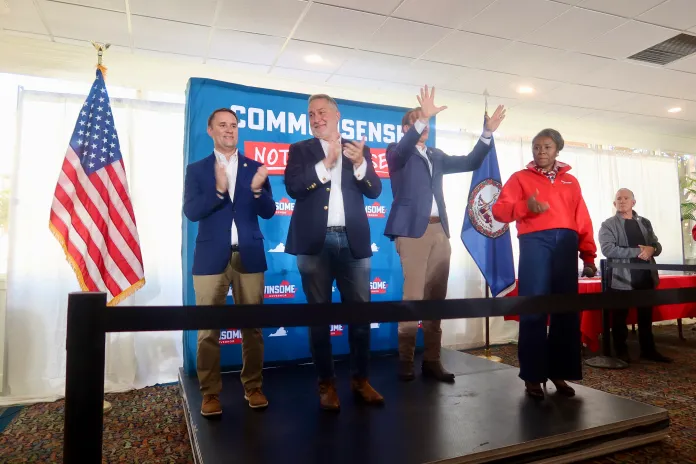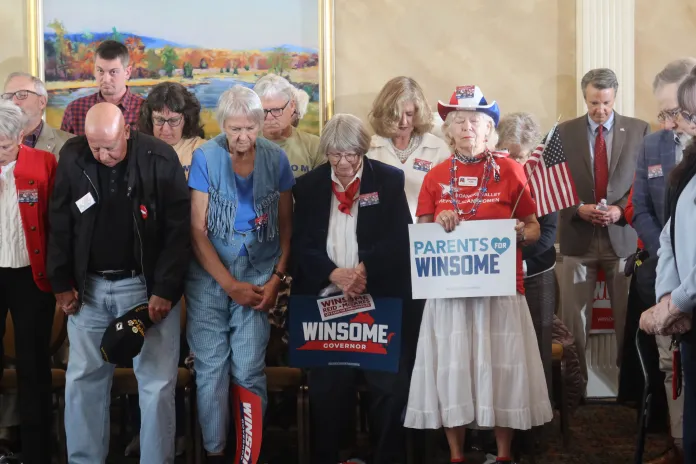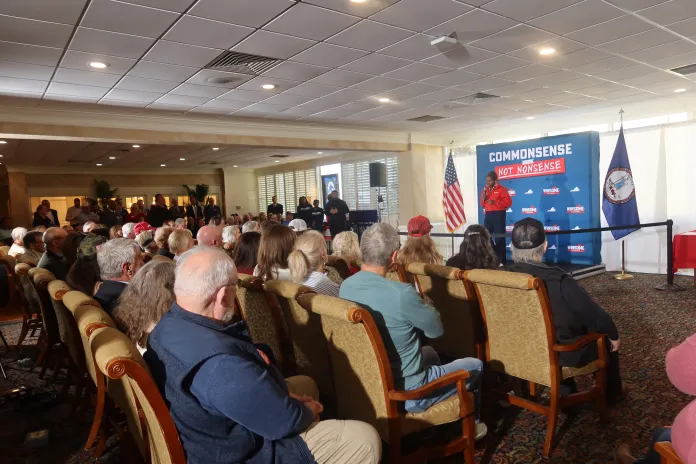ROANOKE, Virginia — As Lt. Gov. Winsome Earle-Sears (R-VA) closes out her bid for governor of Virginia, the loudest voice in Republican politics is the one going unmentioned.
At the Shenandoah Club in Roanoke on Monday, Earle-Sears stood before rows of supporters beneath a blue backdrop reading “Common Sense, Not Nonsense.” She railed against Democrat Abigail Spanberger over taxes, energy policy, and crime, casting the race as a fight for Virginia’s future and warning voters to “make the darkness tremble.” She invoked faith, family, and the American dream, but never once mentioned President Donald Trump.
The same omission came earlier in the program from Gov. Glenn Youngkin (R-VA), who urged voters to “get 10 friends to the polls” and described the election as a “fork in the road” between “light” and “dark.” Like Earle-Sears, he avoided any reference to the president.

That silence is striking in a political era still defined by Trump, even as Democrats are already attempting to frame Tuesday’s results as a measure of his strength and Republicans in the commonwealth work to keep his name out of sight, a far cry from the boisterous campaign trail appearances that once defined his political style.
Trump dialed into a get-out-the-vote call for Earle-Sears on Monday night, before doing the same for New Jersey Republican gubernatorial nominee Jack Ciattarelli. It was a minimal show of support that stands in sharp contrast with former President Barack Obama, who spent the weekend rallying in person for Earle-Sears’s opponent, Spanberger, and for Ciattarelli’s Democratic counterpart, Rep. Mikie Sherrill (D-NJ).
Trump’s hands-off approach to the Virginia gubernatorial race appears driven as much by political pragmatism as by personal history. His list of 53 endorsements on social media Sunday boosted first-time hopefuls and sitting governors such as Sarah Huckabee Sanders (R-AR), but Earle-Sears’s name was missing.
He has declined to give her a formal endorsement, instead telling reporters last month that “the Republican candidate” in Virginia should win “because the Democrat candidate is a disaster.” He added, “I haven’t been too much involved in Virginia. I love the state. I did very well in the state. I think the Republican candidate is very good.”
The distance is partly strategic in a state where Trump remains unpopular and Republicans, including Earle-Sears, are courting swing voters wary of his brand. Still, the tension between them lingers from 2022, when Earle-Sears questioned his leadership after Republicans’ midterm losses, saying “a real leader knows when they have become a liability.” Trump shot back, calling her “a phony” and saying he had “never felt good” about her.
Now, as she seeks to become Virginia’s first black female governor, that rift remains visible, if unspoken. Trump’s absence may ultimately help her in a state where he remains unpopular. An Emerson College/the Hill poll released Sunday found his job approval at 45% and disapproval at 54% among Virginia voters, numbers that have Republicans focusing their message on pocketbook and quality-of-life issues rather than the president himself.

Roanoke, which voted about 61% Democratic in 2020 and 60.8% in 2024, is not natural Republican territory, making conservative turnout all the more crucial. Many of Earle-Sears’s supporters in Roanoke said they were not bothered by the lack of visible involvement from Trump.
“I’m not disappointed that President Trump has been less involved,” said Jeanne Duddy, 78, a retired elementary school teacher and a member of the Roanoke Valley Republican Women’s organization. “President Trump has been busy with national things that are important and international things that are important. I know that he would be here if he didn’t have those important details to deal with.”
Others viewed Trump’s light touch as intentional. “I think he’s here,” said Alice Marchesani, 59, who moved to nearby Daleville in June and has already voted for Earle-Sears. She cited recent Republican Governors Association spending and Trump’s tele-rally as signs of quiet support. “He’s done what he needs to do without drawing attention to himself,” she said. “There’s so much Trump derangement syndrome out there. This way, he helps her without becoming the issue.”
Republican voters spoke less about Trump than about what the race might signal for 2026. “This is a bellwether, for sure,” Marchesani said, calling the contest “good versus evil,” not simply Republican versus Democrat. Another voter, Bryon Lewis, 50, an engineer from Roanoke, predicted that national media would treat the outcome as a verdict on Trump, no matter what happens. “If Winsome wins, then it won’t be a referendum, as far as the media is concerned,” he said. “But if she doesn’t win, they’ll take that as a referendum on Trump, and I don’t think that’s the case.”
Democrats, by contrast, have made Trump the centerpiece of their final argument. Spanberger’s closing message before Election Day leaned heavily on what she described as the “chaos” of Trump’s second administration, urging Virginians to “install new leadership” in Richmond. At a Sunday rally in Falls Church, Spanberger said Virginia needed “a governor who will stand up for our federal workforce,” referencing Trump’s Department of Government Efficiency and its efforts to slash civil service jobs during the government shutdown.
The next day in Richmond, she framed the contest as a chance to chart a new direction. “It’s about ensuring that people know, at this time when it can be easy to feel weary and sad and worried, that we are giving people not just hope but a plan and a path toward making a change,” Spanberger told supporters.
Her surrogates have been far less subtle. Sen. Elissa Slotkin (D-MI) compared the moment to 2018, when Democrats swept suburban districts across the country. “That was the first midterm election after Trump had been elected,” Slotkin said at a Monday rally. “And we were wondering then, as we wonder now, what direction our country was going to go.”
Sens. Mark Warner (D-VA) and Tim Kaine (D-VA), both former governors of the commonwealth, joined Spanberger in Falls Church on Sunday, attacking Trump’s record on immigration, inflation, and the federal workforce. Warner mocked the 47-day training program for new ICE agents as “because Trump’s the 47th president,” while Kaine blasted him for rising prices. And at a high-energy rally in Norfolk over the weekend, former President Barack Obama went further, warning that Trump was “eroding American democracy.” “It’s like every day is Halloween,” Obama quipped. “Except it’s all tricks and no treats.”
Republican strategists, however, were more blunt. From Washington, D.C., to Richmond, several described a campaign that never quite found its footing and a map that increasingly favored Democrats.
“Come Tuesday, Virginia will revert back to being a blue state,” GOP strategist Dennis Lennox said. “Youngkin was a fluke. Any prospect of Republicans having a serious chance of keeping the Old Dominion this year was, at best, a mirage that dissipated months ago. It’s hard to see what the president could have done to improve Republican chances. For him, it was better to stay away and not get involved in what was almost always going to be a Democrat pickup, particularly with the disjointed Earle-Sears-Reid Republican ticket.”
A Republican operative granted anonymity was even harsher about Trump’s calculations. “I think it’s pretty clear why Trump hasn’t endorsed Winsome Earle-Sears,” the operative said. “He hates associating his name with losers, and it’s almost a foregone conclusion that Earle-Sears is not going to win her election. He is doing the absolute least by doing this tele-rally.”

Trump’s quiet posture in Virginia is not new. Four years ago, he was also absent from the campaign trail as Youngkin won the gubernatorial race by keeping the former president at arm’s length. Trump endorsed Youngkin in his 2021 contest against Democrat Terry McAuliffe, but the Republican newcomer avoided appearing with the then-former president and steered clear of his MAGA agenda to appeal to independent and suburban voters.
The circumstances, though, are very different now. In 2021, Trump was an unpopular former president. Today, he is back in office, and the distance between him and Virginia Republicans carries far higher political stakes.
His muted involvement in the race marks a sharp contrast with the White House’s aggressive push earlier this year to promote its signature tax and spending bill across key battleground states. Vice President JD Vance led a national tour touting benefits for working-class families, with stops in Pennsylvania, Ohio, Wisconsin, and Georgia, joined by a rotating cast of Cabinet secretaries, a coordinated blitz that underscored how central the administration views the legislation to its 2026 midterm message.
YOUNGKIN MAKES FINAL PUSH TO DEFINE HIS LEGACY AS VIRGINIA CHOOSES NEXT GOVERNOR
In Virginia, by contrast, Trump has opted for distance over dominance, leaving Earle-Sears to find out whether a Republican can still win statewide by following the Youngkin model in a very different era. For all the strategy and silence from the top, voters here said Trump’s shadow still loomed over the race.
“If Winsome wins, it shows Republicans can still do it without Trump front and center,” said Stephanie Lewis, 38, an accountant from Roanoke. “If she loses, you can bet he’ll say it’s because she didn’t have him. Either way, it always comes back to Trump.”
